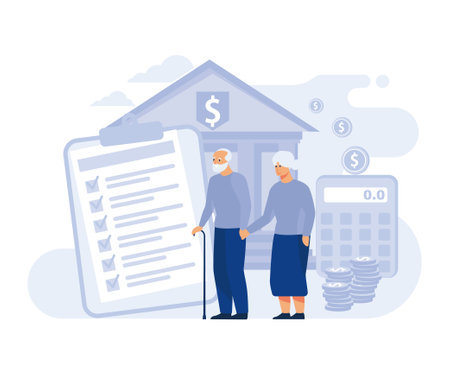Understanding Senior Life Insurance Needs
As Americans approach retirement, many begin to reassess their financial priorities. For seniors, life insurance isn’t just about replacing lost income—it’s a tool for ensuring final expenses are covered, leaving a meaningful legacy, and providing peace of mind for loved ones. In the U.S., where healthcare costs and funeral expenses can be substantial, having the right policy in place can help protect family members from unexpected burdens. Additionally, with the growing trend toward independent living and self-funded retirements, many seniors seek life insurance as part of a comprehensive risk management strategy. Whether it’s making sure adult children aren’t saddled with debt or supporting favorite charities, understanding these needs is the first step to selecting an appropriate policy type.
Overview of Policy Types: Whole, Term, and Guaranteed Issue
When considering senior life insurance in the United States, understanding the main policy types is essential for making informed decisions. The three primary options—Whole Life, Term Life, and Guaranteed Issue—each serve different needs and come with unique eligibility criteria and features. Let’s break down what sets these policies apart in the context of the American insurance landscape.
Whole Life Insurance
Whole life insurance is a permanent coverage option, meaning it remains in force as long as premiums are paid. It typically offers fixed premiums, a guaranteed death benefit, and a cash value component that grows over time. This type of policy is often chosen by seniors looking for lifelong coverage and those interested in leaving a financial legacy or covering estate expenses.
Term Life Insurance
Term life insurance provides coverage for a specified period—commonly 10, 15, or 20 years—and pays a death benefit if the insured passes away within that term. It’s generally more affordable than whole life but does not accumulate cash value. Seniors may consider term life to cover specific financial obligations like outstanding debts or to provide income replacement during retirement years.
Guaranteed Issue Life Insurance
Guaranteed issue policies are designed for individuals who may have health concerns that make traditional underwriting challenging. There are no medical exams or health questions required. While these policies offer lower coverage amounts and higher premiums compared to other types, they provide peace of mind for seniors seeking minimal barriers to qualification.
Policy Type Comparison Table
| Policy Type | Coverage Duration | Medical Exam Required | Cash Value Accumulation | Typical Use-Case |
|---|---|---|---|---|
| Whole Life | Lifelong (as long as premiums are paid) | Yes | Yes | Estate planning, lifelong protection, wealth transfer |
| Term Life | Set term (e.g., 10–20 years) | Usually Yes | No | Temporary needs, debt coverage, income replacement |
| Guaranteed Issue | Lifelong (limited face amount) | No | No/Minimal | Final expenses, easy qualification regardless of health |
The American Perspective on Senior Life Insurance Policies
Navigating these options requires balancing personal needs with risk management. In the U.S., whole and term life insurance are regulated at the state level and offered by major carriers with varying features. Guaranteed issue policies are widely accessible and appeal to seniors who prioritize simplicity and certainty over maximum benefit amounts. Understanding each policy’s strengths helps seniors and their families make choices that protect both legacy and financial stability.

3. Key Differences and Considerations
When self-employed seniors are weighing their life insurance options, it’s critical to break down the key differences among whole life, term life, and guaranteed issue policies. The following factors—premium costs, policy durations, coverage limits, and cash value features—should be evaluated with a risk management mindset that aligns with your business and personal goals.
Premium Costs
Term Life: Typically offers the lowest premiums, making it attractive for budget-conscious seniors who need straightforward coverage for a set period.
Whole Life: Premiums are higher but remain level and also contribute to the policy’s cash value.
Guaranteed Issue: Usually comes with the highest premiums due to minimal underwriting and increased insurer risk. For seniors with health concerns, this might be the only option—but be prepared for the cost.
Policy Durations
Term Life: Offers fixed durations—usually 10, 15, 20, or 30 years. When the term ends, so does your coverage unless you renew (often at a much higher rate).
Whole Life: Provides lifelong protection as long as premiums are paid.
Guaranteed Issue: Also permanent, but many policies include a graded death benefit period in the first few years.
Coverage Limits
Term Life & Whole Life: Both offer flexible coverage amounts, but eligibility and affordability depend on age and health.
Guaranteed Issue: Coverage is typically limited (often $25,000 or less), which may only cover final expenses rather than broader financial needs.
Cash Value Options
Whole Life: Accumulates cash value over time—an attractive feature for self-employed individuals seeking liquidity or loan opportunities.
Term Life & Guaranteed Issue: These policies do not build cash value; they are pure protection vehicles.
Risk-Based Approach: What Self-Employed Seniors Should Evaluate
If you’re self-employed, your financial stability often depends on both personal and business assets. Consider these questions:
- Can you afford higher premiums without impacting your cash flow?
- If your business income fluctuates, will a policy with flexible payment options or built-in cash value offer more security?
- Are you primarily seeking income replacement for dependents or just coverage for final expenses?
- If health is a concern, are you prepared to pay more for guaranteed acceptance?
A careful evaluation of these elements will help ensure your chosen policy supports both your lifestyle and entrepreneurial risks as you age.
4. Pros and Cons for Seniors
Choosing the right senior life insurance policy means weighing the strengths and weaknesses of each option based on your unique needs, budget, and family situation. Here’s a breakdown of how whole, term, and guaranteed issue policies compare for seniors in typical American contexts:
| Policy Type | Pros | Cons |
|---|---|---|
| Whole Life Insurance |
|
|
| Term Life Insurance |
|
|
| Guaranteed Issue Life Insurance |
|
|
Real-Life Scenarios for American Seniors and Families:
A Retired Couple on a Fixed Income:
If your primary goal is to provide a small financial cushion for your spouse or cover end-of-life expenses without draining savings, guaranteed issue might make sense despite its cost. Whole life could be too expensive unless purchased earlier.
An Individual With Health Concerns:
If you have pre-existing conditions and cant pass a medical exam, guaranteed issue offers crucial access to coverage. However, be aware of limited benefits during the first few years.
A Senior Supporting Adult Children or Grandchildren:
If youre helping with college tuition or housing, whole life insurance can offer lasting protection and potential cash value support. Term insurance can work if your financial responsibility has an end date.
Key Takeaway:
No single policy type fits every senior’s situation. Assess your health, financial responsibilities, and long-term goals before choosing. In most cases, balancing premium affordability with necessary coverage is key to responsible risk management.
5. Risk Management and Smart Policy Selection
When selecting a senior life insurance policy in the U.S., it’s crucial to approach the process with a risk management mindset. Seniors should assess their coverage needs based on factors such as outstanding debts, anticipated end-of-life expenses, and any legacy goals for loved ones. At the same time, it’s important to balance these needs with budget constraints and health considerations.
Assessing Your Financial Situation
Begin by evaluating your current financial obligations. Do you still have a mortgage or other significant debts? Are there dependents who rely on your income or support? Understanding these aspects will help determine whether a term, whole, or guaranteed issue policy aligns best with your situation. For example, if you’re debt-free and primarily concerned about funeral costs, a smaller guaranteed issue policy may suffice.
Budgeting for Premiums
Premiums can vary widely across policy types. Term policies tend to offer more affordable coverage but only for a set period—making them suitable if you need protection during specific years. Whole life policies come with higher premiums but provide lifelong coverage and a cash value component. Guaranteed issue policies are typically the most expensive per dollar of coverage due to their lenient health requirements, so make sure your monthly premium won’t strain your retirement income.
Health Considerations and Underwriting
Your health status is a significant factor in risk control. If you’re in good health, traditional underwriting for term or whole life insurance can unlock lower premiums and higher coverage limits. However, if you have pre-existing conditions or are older, guaranteed issue policies offer acceptance without medical exams—but at a higher cost and with limited benefits for the first two years (graded death benefit).
U.S.-Specific Strategies for Seniors
Take advantage of annual reviews during Medicare open enrollment to reassess both your healthcare and insurance needs. Consult independent agents who represent multiple insurers to compare quotes and policy features; this helps avoid captive agents who may push a single product line. Remember, many states have free counseling services (like SHIP) that offer unbiased advice on insurance options for seniors.
Risk Control Tips
Never rush into buying a policy—use the “free look” period mandated by most states to review the terms after purchase. Always read the fine print regarding exclusions, waiting periods, and benefit limitations. And finally, keep beneficiaries updated and inform trusted family members about your policy details to ensure smooth claims processing when needed.
6. Frequently Asked Questions About Senior Life Insurance
What Is the Best Type of Life Insurance for Seniors Over 60?
The answer depends on your specific needs, health, and financial situation. Whole life insurance offers lifelong coverage and cash value growth but comes at a higher premium. Term life is more affordable and straightforward but only covers you for a set period. Guaranteed issue policies are best for those with health concerns who may not qualify elsewhere, though they typically have lower benefits and higher costs. Self-employed seniors often lean toward flexible solutions that protect both personal and business interests.
Can I Get Coverage If I Have Health Issues?
Yes, guaranteed issue policies require no medical exam or health questions, making them accessible even with pre-existing conditions. However, these plans usually have graded death benefits—meaning limited payouts in the first few years—and higher premiums. Consider this carefully if you’re managing long-term business responsibilities or family obligations.
How Much Coverage Should I Buy?
Assess your outstanding debts, ongoing living expenses, business liabilities (if self-employed), and desired legacy for loved ones. Avoid the pitfall of underestimating your needs; over time, inflation and unexpected costs can erode the value of your policy. A careful risk assessment ensures you won’t leave gaps in coverage that could impact your family or business.
Are There Common Mistakes Seniors Make When Buying Life Insurance?
Yes—common missteps include waiting too long to apply (which raises premiums), buying more coverage than necessary, or failing to update beneficiaries as circumstances change. Self-employed individuals sometimes overlook using life insurance as a tool for succession planning or to secure business loans. Consult with a qualified advisor who understands both personal and entrepreneurial risks.
Does Life Insurance Affect My Retirement Benefits?
No, proceeds from life insurance are generally not taxable income and do not affect Social Security or Medicare eligibility. However, large payouts may impact Medicaid eligibility due to asset limits, so plan accordingly if long-term care coverage is a concern.
What’s the Smartest Way to Shop for Senior Life Insurance?
Compare quotes from reputable providers, review all terms carefully, and be honest about your health and lifestyle. For the self-employed, ensure your policy aligns with both your personal and professional risk management strategies. Avoid policies with hidden fees or unclear exclusions by reading all documentation thoroughly before signing.

